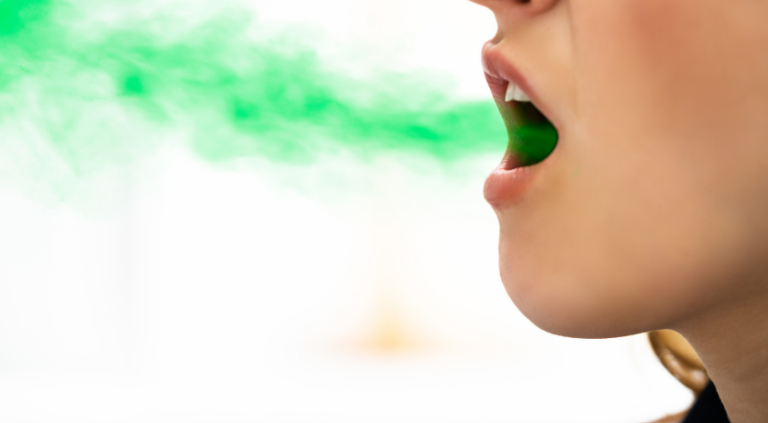Last Updated on October 9, 2023 by Nala Thorpe
Ever wondered why your breath smells like weed, even though you don’t smoke? It’s a perplexing situation that can leave you scratching your head. As an expert, I’ve delved into the possible reasons behind this phenomenon to provide some clarity.
One possible explanation could be that you are exposed to secondhand marijuana smoke on a regular basis. If you spend time in close proximity to individuals who smoke weed, the smell can cling to your clothes and hair. Additionally, particles from the smoke may settle in your mouth and throat, leading to a lingering odor reminiscent of cannabis.
Why Does My Breath Smell Like Weed But I Don’t Smoke
Dry Mouth: A Common Culprit
One possible explanation for breath that smells like weed, even if you don’t smoke it, is dry mouth. When your mouth doesn’t produce enough saliva to keep it moist, bacteria can multiply and cause an unpleasant odor. Dry mouth can occur due to a variety of factors such as dehydration, certain medications, or breathing through the mouth.
To combat dry mouth and minimize the weed-like odor, try these tips:
- Drink plenty of water throughout the day to stay hydrated.
- Avoid caffeine and alcohol as they can contribute to dryness.
- Chew sugar-free gum or suck on sugar-free candies to stimulate saliva production.
- Use a humidifier in your bedroom at night to add moisture to the air.
Dietary Factors and Breath Odor
What you eat can also play a role in causing breath that resembles the smell of weed. Certain foods have strong odors that may linger on your breath long after consumption. For example, foods like garlic, onions, spicy dishes, and certain cheeses are notorious for giving off potent aromas.
While these food-related odors are usually temporary and will dissipate with time and good oral hygiene practices, there are some steps you can take to minimize them:
- Practice regular brushing and flossing to remove food particles that could be contributing to bad breath.
- Consider using a tongue scraper or brush specifically designed for cleaning your tongue since bacteria tend to accumulate there.
- Rinse your mouth with an alcohol-free mouthwash that contains ingredients like zinc or chlorhexidine which help neutralize odors.
Oral Hygiene Habits and Bad Breath
Poor oral hygiene habits can lead to various issues including bad breath. If you’re not diligent about cleaning your teeth, gums, and tongue regularly, bacteria can thrive in your mouth and give off foul-smelling compounds.
Here are some strategies for maintaining good oral hygiene and preventing weed-like breath:
- Brush your teeth at least twice a day for two minutes each time, using a fluoride toothpaste.
- Don’t forget to clean your tongue gently with a toothbrush or scraper to remove any residue that may contribute to odor.
- Floss daily to remove plaque and food particles from between your teeth.
- Consider using an antimicrobial mouthwash as part of your oral care routine.
By addressing these possible causes, you can take steps towards freshening up your breath and reducing the weed-like odor, even if you don’t smoke. Remember, if the issue persists or worsens despite practicing good oral hygiene, it’s always best to consult with a dental professional who can provide further guidance and assistance.

Oral Hygiene and Dental Issues
Dental Issues That Can Cause Bad Breath
Maintaining good oral hygiene is crucial for fresh breath, but sometimes even with proper care, you may find yourself wondering why your breath smells like weed when you don’t smoke. The answer may lie in certain dental issues that can contribute to unpleasant odors emanating from your mouth.
One common culprit is gum disease. When plaque builds up along the gumline, it can lead to inflammation and infection, causing bad breath. Additionally, the bacteria associated with gum disease release volatile sulfur compounds (VSCs), which have a distinct odor resembling weed.
Dry Mouth and Dehydration
Dry mouth, also known as xerostomia, can contribute to the development of bad breath. When your mouth doesn’t produce enough saliva, it creates an environment where bacteria can thrive, leading to an unpleasant odor. There are several reasons why dry mouth may occur, including medications, health conditions, and lifestyle habits.
Medications and Breath Odor
Certain medications can cause dry mouth as a side effect. This reduction in saliva production can lead to the buildup of bacteria in the mouth, resulting in foul-smelling breath. Some common types of medications that may contribute to dry mouth include:
- Antidepressants
- Antihistamines
- Diuretics
- Pain medications
If you suspect that your breath smells like weed but you don’t smoke and you’re taking any of these medications or others associated with dry mouth, it’s worth discussing this concern with your healthcare provider.




